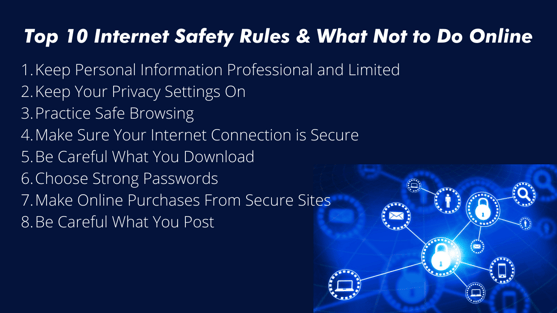Adults spend about 4 hours every day connected to the internet and complaints and frustrations about web browsing experiences are on the rise. There are a few common themes that happen including a lack of website compatibility, the threats posed by malicious software and viruses, and concerns about intrusive advertising, disruptive pop-ups, and data privacy.
There are many ways to protect yourself and make your internet experience a safer and more satisfying experience, no matter whether you are browsing on a laptop, tablet or smartphone. Here are some of our top tips:
Pop-ups must be disabled
While your operating system's desktop pop-ups are inescapable, pop-ups on your web browser may often be turned off.
While most browser pop-ups are simply unpleasant, others can include harmful links or improper content.
Most browsers have popup filters that automatically block them and allow you to accept them for trustworthy sites where
they may be useful.
Make use of an ad blocker

Adblockers have grown in popularity as a result of pop-up advertising and the feeling of ads following you throughout the internet. Ad blockers prevent websites from showing you advertisements, which seems great until you understand how contentious this topic is and how much of an influence it could have on the websites you visit.
Ads pay for most websites on a pay-per-impression basis, so if you use an ad blocker, you're denying the publisher the cash that keeps the site functioning.
By all means, use an ad blocker to protect yourself, but also consider whitelisting your favourite websites, as ad income is what keeps them afloat!
Set your browser to "do not track" mode
Many browsers allow you to send websites a "do not track" request, instructing them not to gather or track your browsing data. What happens, however, is determined by how the websites respond to the request - most websites and web servers, for example, do not change their behaviour and appear to disregard the request. Even so, making it obvious that you don't want to be followed is an excellent place to start.
Clear the cache and cookies in your web browser
Even if websites choose to track your browsing data, you can reduce the impact by clearing your browser cache and deleting unneeded cookies on a regular basis. This stops advertisements from following you throughout the internet and ensures you're downloading the most recent version of a web page.
You can do this manually in all major browsers and easily erase all your data, but there are also software solutions that automate the process to make your life easier. Regardless of the approach you use, you might want to consider whitelisting the sites where you frequently log in to prevent having to re-enter login information all the time.
Enable private browsing
Private browsing safeguards your personal data and prevents some websites from recording your search and browsing history. It won't keep your online behaviour hidden from your internet service provider, but it can limit cookie buildup, which can be useful if you're shopping for a significant other online.
Use a virtual private network (VPN)
Virtual proxy networks, or VPNs, enable you keep your data and internet requests private by encrypting them before they reach the internet. No matter how you connect to the internet, the technique is the same: encrypted data is transferred to the VPN server, which decrypts the requests before sending them on to the online destination.
Use a password manager
Because of the high amount of password leaks that occur when websites are hacked, using the same password across many sites is extremely risky. You should use unique passwords on each website to prevent password leaks from being too destructive. Strong passwords — long, unexpected passwords with digits and symbols – should also be used.
It's nearly hard to remember strong passwords for all those various passwords, which is where a password manager comes in. They encrypt and securely store your login information for all of the websites you visit, allowing you to log in automatically with only one master password to remember.
It's nearly hard to remember strong passwords for all those various passwords, which is where a password manager comes in. They encrypt and securely store your login information for all of the websites you visit, allowing you to log in automatically with only one master password to remember.
Make sure your antivirus and firewall software are up to date
No matter how carefully you browse the web or how knowledgeable you think you are about the links you click and the files you open, you need antivirus and firewall security software on your computer.
Even the most trustworthy websites or files from the most trusted of sources can include threats, so making sure you're secured with smart antivirus software is well worth the tiny investment in time. Big data and artificial intelligence are used by the most trustworthy antivirus software solutions now available to monitor every running application and detect assaults before they happen.
An unprotected computer is like an open door for websites that threaten your internet safety with spyware and computer viruses. Firewalls monitor internet traffic in and out of your computer and hide your PC from online scammers looking for easy targets. Do you need help making sure your computer is secure? Contact us today for a complimentary business systems assessment!



.png?width=1080&name=GOOGLE%20REVIEW%20(1).png)